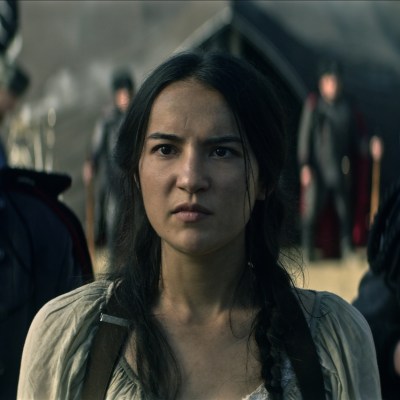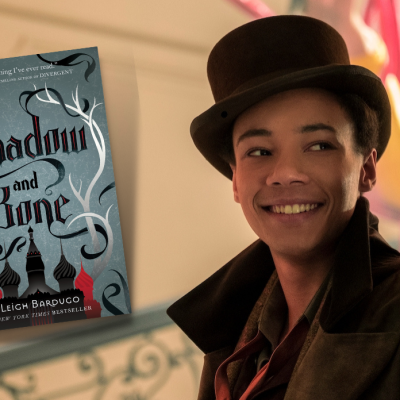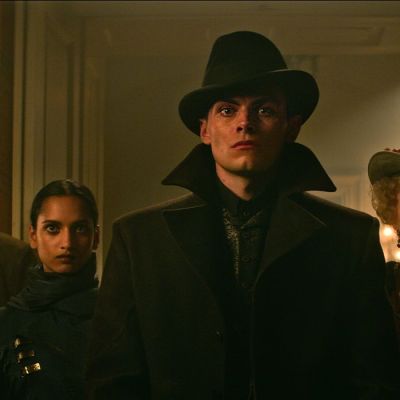The Art of Bringing a Shadow and Bone Scene to the Screen
We talked to Shadow and Bone director Mairzee Almas about bringing a palace party to life, filming Nina and Matthias at sea, and creating the mood and visuals for that Darklina kiss.
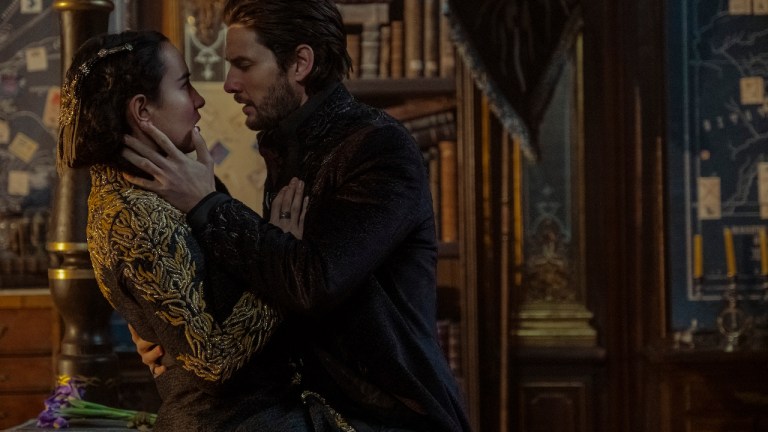
This Shadow and Bone article contains major spoilers for Episodes 5 & 6.
As the director behind Episode 5, “Show Me Who You Are,” and 6, “The Heart is An Arrow,” of Shadow and Bone, Mairzee Almas was behind the camera for some of the major turning points of Season 1. These episodes see Alina and General Kirigan’s romantic interlude, Baghra’s reveal that Aleksander is actually the Black Heretic, and the coming together of the Crows and Alina for the first time. It’s when the season really kicks into a higher gear. Den of Geek talked to Almas—whose work you have previously seen on shows like The 100, Outlander, the Arrowverse, Jessica Jones, Shadowhunters, and Smallville—about bringing the Grishaverse, and some of these emotional and game-changing moments, to the screen.
The Work of a TV Director
“When you are a director for hire, you come in and receive the script and your job is to present the visual interpretation of the script,” explains Almas, when asked to explain the job of a TV director in simple terms. “As one of the collaborative artists on set, I take the script, I break it down, I think about the character journeys. I try to elevate the material, try to elevate the script, try to support the actors in creating their very best performances, understanding that they have a journey to make in your episode or episodes.”
Of course, for every director, the process of interpreting said script looks a little bit different. For Almas, she works by grounding the visual interpretation in the performances of the actors. “I start from an acting point of view, a performer’s point of view. It’s all about the performance. It starts and really ends with that. Everything else that we do is to support that proponent and to tell a story in a compelling way, right?”
For Almas, this means sitting down with the actors to discuss and articulate their character’s journey in the episode or episodes: “I would sit with the actors and say ‘How are you different at the end of the episode than you were from the beginning? Where are the moments where your character has agency, where they had a decision they could make? They could go left, they could go right, but they made this choice instead of that choice. And where are these big pivotal moments for your character?’”
The script is the source from which all other action will come, but Almas says the moments to be captured on screen are often up for some interpretation, which gives the director and actors space to collaborate on a specific vision.
“We’ll work it out so that we’re in a collaborative agreement,” explains Almas. “Where are these moments? And then I might say, ‘Oh, it’s on this line’ or ‘It’s around in here where you make a decision,’ and the actor may say ‘No, no, I think I made it earlier. It was over here.’”
Once the director and actor agree on an interpretation of the scene, Almas says she will design the shots and blocking to support that moment.
“I will always try to find a way to have the camera support the subtext of the scene, and make sure that everything we are doing, whether it’s the blocking or the camera work, are really supporting what’s going on underneath the scene.”
On that note, let’s dive into some of the scenes from Episodes 5 and 6 that Almas directed. I encourage you to watch the scenes before or after reading Almas’ commentary. I’ve included the time codes for reference.
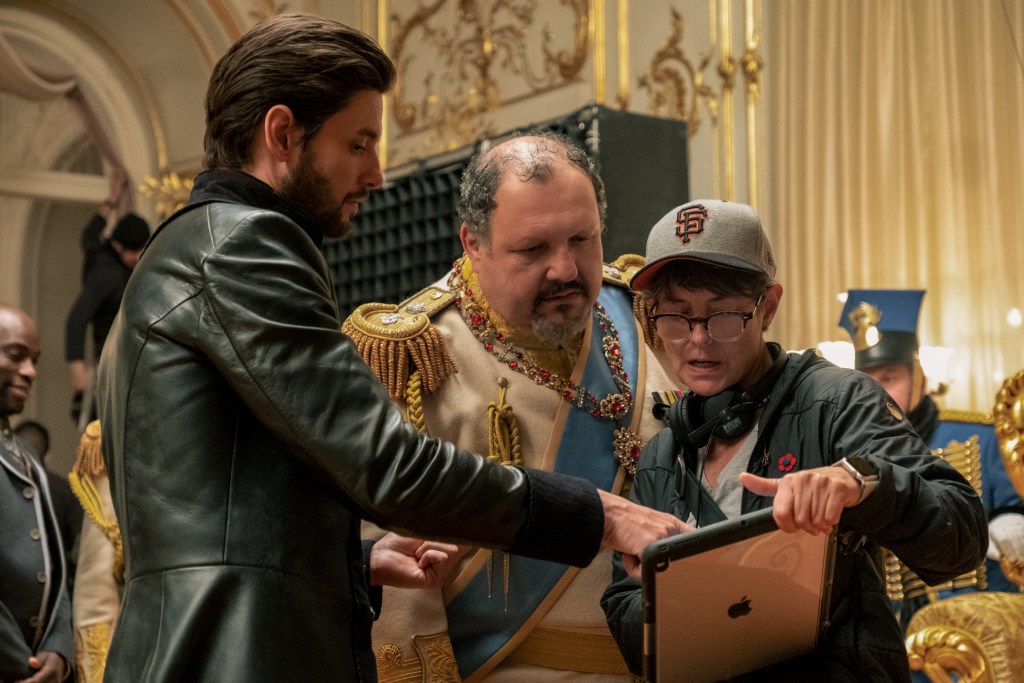
The Palace Party Scene
Episode 5, 20:20 – 27:22
Den of Geek: This seems like a massive scene. Was this one of the largest scenes that you had to direct in the two episodes?
Mairzee Almas: Yes. It was a big scene with a lot of people, with a lot of moving parts. This was of course was done in the beautiful castle of Keszthely in Hungary. Many of our background performers did not speak English, but, honestly, people in Europe manage thousands of languages, it seems, and we North Americans can barely stumble through one.
You had a really long shot coming into the party too.
Yeah, so big steadicam shot to try and feel the energy of all of the people and see some of the beautiful costumes that Wendy [Partridge] has managed to get, to create.
How many extras did you have? I mean, I’m guessing this is a few different sequences this party altogether, but it seems like there’s a lot of people.
There’s a lot of people, I think we had somewhere 250, something like that.
And this is also really exciting because it’s really the first time we see the Six of Crows and the Shadow of Bone world coming together and the adaptation. Was that something that you guys talked about or that you really thought about when you were directing this?
Yes. For sure. Whenever we were bringing these two different literary worlds together it was important and fun and new and fresh, which was great fun. The Crows, of course they are the the heist vibe, a little like Oceans 11.
Yeah, I’m seeing that in the format of what you’re viewing here, with that quick pan cut.
Yeah. That was something that Lee [Toland Kreiger] had started in the pilot with this idea of a whip pan, it’s called, to go from one thing to the next, which is really fun and gives you that immediacy. We just did one right there. When we were going between storylines, between storyline characters, it was very good.
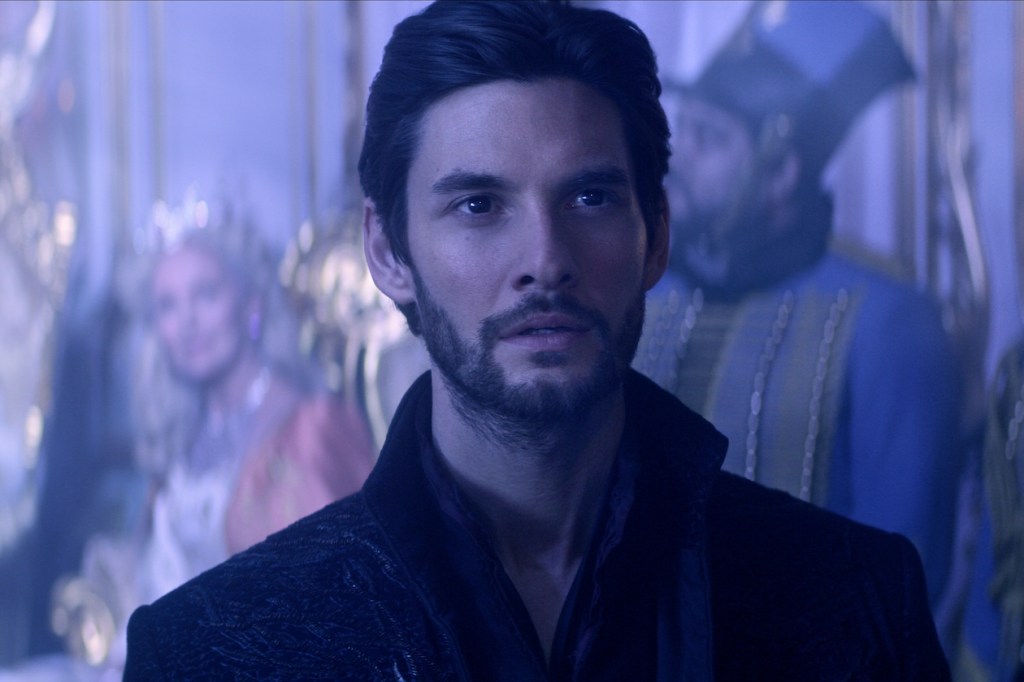
Something else that stood out to me about this episode and this scene, I think is we get more of Aleksander’s point of view. I feel like this is the episode that you have to kind of sell the viewer on Aleksander before you get that real turn. What was your view on that?
Like any good antagonist, he truly believes 100% in what he’s doing. And I think the character believes that what he is doing is the right thing and the right thing for the people, for his people, the Grisha. And I think he has been waiting for Alina for hundreds of years. He’s been waiting for this woman to be his equal, to be someone who understands him, to be his partner. And he is lonely and he has a deep ache for her. So he’s not playing it like just a hollow manipulator who doesn’t care. He has genuinely been waiting. And I think that the more the actor, Ben [Barnes], the more he is able to invest that character with a need, the more real it is, the more loving it is.
Yeah. He does a good job.
He does a good job. Yeah. And I was sowing a little bit of seeds in there with Genya and David as well.
Yeah. They don’t get a lot of screen time in the first season, but I know that a lot of fans of the book are really excited to see their dynamic. And there’s a cool shot of the Crows with the chandelier in the foreground right there.
Yeah. Thank you. And that was just to show that Kaz’s skepticism about Alina being a saint and the consummate con man doesn’t believe anything.
Alina is having quite a growth in this episode and I believe that Kirigan wants the best for everyone. He wants the best for his people and he wants the best for her. And he wants finally, finally, he wants to have a partner.
As you were saying before you had those conversations, I’m assuming, with Ben and Jessie [Mei Li] as you were directing these scenes.
Absolutely. And I think when we get later to the scene, when we were talking about the kiss and then Marko’s entrance, there’s a real adult kind of turn to that, as opposed to the childhood sweethearts that she had before. So things were changing for her and this is… we’re seeing it here is her becoming an adult, essentially growing up and starting to own her power. And as my grandmother would say “Settling into her hips.” Becoming a full grown adult woman, this is her beginning of that.
She seems so happy here. It’s kind of it’s sad knowing what’s going to happen after, but it’s also still great.
I mean, it’s the story about outcasts and people outside who have no place. And she’s finally feels like she has somewhere to be in and a community to be a part of. Finally, finally, finally, only to have it torn away from her again.
So logistically when you’re filming a scene like this, with the lighting changing abruptly while the Grisha do their thing, do you have different colored lights on set?
We did. And my director of photography is this incredibly talented man named Aaron Morton, who was fabulous. So we had a crane for the camera in this space, but we also had a crane with lights on it so that the lights could shift over top of people. So we could do both for the red lights when the Inferni were playing with fire, but also for Alina’s display. So we were moving light above and over people. Then the visual effects adjusted it and sort of gave it a texture. But really the moving of the light was done practically.
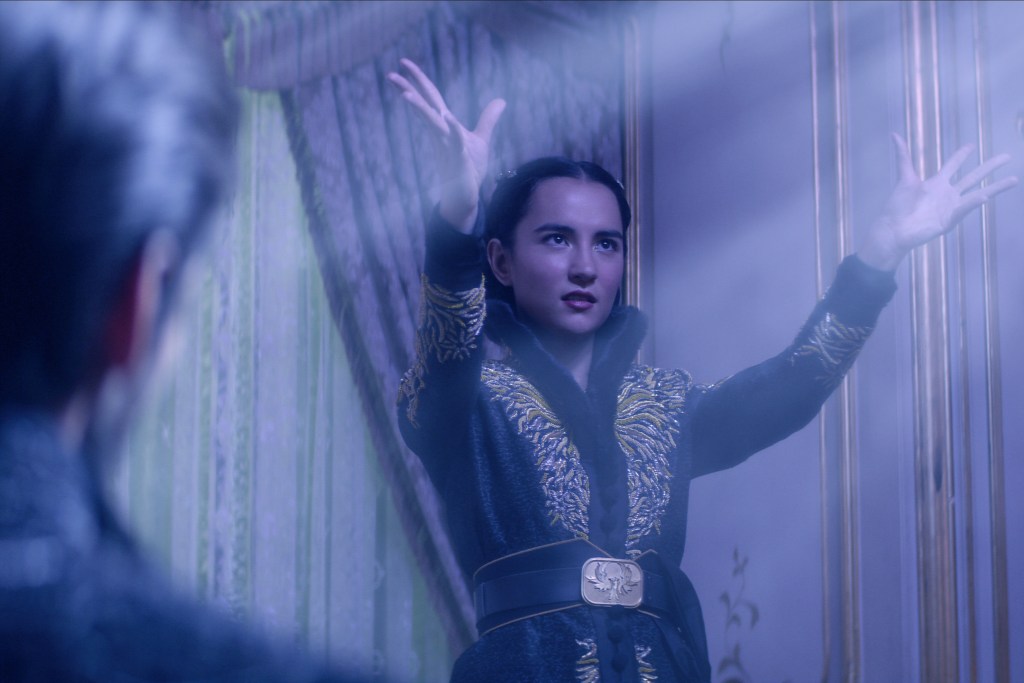
I’m going to end here, for this scene, but this was one of my favorite shots, coming in slowly on Inej and seeing Amita’s performance, I think it’s so beautiful as she gets to see Alina as the Sun Summoner.
Yeah. This is somebody, a character who is deeply religious, but if you think about what her background has been and how she has been abused and in the Menagerie, and what kind of terrible experience she’s had without any control in her life or any say in what has happened to her or her body, you have a sense that her religion is what has gotten her through to get to this moment to, to be alive, to still be alive.
That Darklina Scene & Baghra’s Reveal
Episode 5, 39:28- 46:31
OK, now we’re back with Kirigan and Alina, and they’re just having a nice time. Yeah. This is a beautifully shot scene and you have this, this moment coming up where you actually see their shadows on the wall behind them. Could you talk about that?
We have a bit of flares with Alina because she is the Sun Summoner, but yeah, I orchestrated the shadow. I mean, I had to choreograph the actors to find that shadow moment, and bless their little cotton socks because it’s sort of an artificial bit of movement for them. But it worked for them both. And I was curious if people would even see that if anybody would notice it or not.
I’ve definitely seen people talking about it on social media.
Oh, they have?
Yeah, for sure. And then talk about the logistics of like a kiss as well. Because it seems like another thing to stage. Not to take the romance out of it…
Right, but it is a stage and you’ll see exactly where his hands are and what he’s doing, and he’s picked her up and he’s put her on the table. I mean, they are about to escalate it to where perhaps she has never been. And this is part of her becoming an adult and then they knock on the door being interrupted again. I go through it with the actors, exactly where the camera’s going to be, what I expect from them, what they’re going to do. And we make sure that they are 100% comfortable with everything and it’s done in a way that it’s private with them, with me and both of them and then me and separately with them, just to chat and make sure that they feel comfortable with what we’re talking about doing. And does it feel right for the character and not gratuitous in any way?
I do love that moment right there when you hold on Alina, and he comes back in frame kind of like a surprise, to kiss her again…
So that was a Ben Barnes special. Ben said “I really want to do this.”
And then see how, what I was doing here with the cameras, trying to do a little bit of a wrap around her, letting her be a little overwhelmed by her background. And in the kissing scene, in this whole sequence before Baghra comes in, the camera is wrapping a little bit. And that, again, makes the background around her feel like it’s moving. So she’s a little unsettled, things are happening pretty quickly to her. And it helps that something about subtext where we as an audience can feel what she’s feeling a little bit.
So a director’s job is not just to dictate the script as written out, it’s to try and find a way to take the audience on this roller coaster ride that the characters are on. And, as a director, with the script of course, sometimes the audience should be with the character, sometimes they’re behind the character, sometimes they’re ahead of the character, but we plot that very carefully and make sure that we’re maximizing the emotional experience for the audience. And really that’s the most important thing is they really have to have a visceral experience. And so whenever you can join in with Alina and what’s going on for her and then to have it so rudely stripped away from her with Baghra coming in…
Such a tonal shift. From Alina’s point of view, everything is going so well with Kirigian, and then we’re in this dungeon-like hallway.
Right, and it’s so much fun because you can see that there’s respect for Baghra, but at the same time, Alina is like “What’s the matter with you? It’s been too hot in your hut, your brain isn’t working, you know, come on. What, what’s the matter with you?”
She’s frustrated.
She’s very frustrated. She’s waiting… he said he’d be right back and then Baghra’s there talking about the Heretic.
Yeah. It’s a real shift for her. And it’s a real shift for the viewer.
Yeah. And then she finally stops Baghra, she jumps in front of her and stops her. “What are you doing? Stop.” And then Zoe Wanamaker—whom I love, absolutely love. I just want a whole spin-off series just with Zoe. Baghra’s fireside chats…
I would love that.
And this is really a lot of exposition that happens in the scene, but you do it so well, and these actors are selling it so well that it doesn’t feel like you’re just listening to information.
Right. And one of the challenges to this… Thank you for saying that. One of the big challenges to this scene is we’ve just built all this time for Alina to start to fall in love with Aleksander. And I can’t have her appear fickle, so somebody comes along and says “Oh, but he’s really a bad guy.” And then she has to believe him or her, rather, she has to fall into that immediately. Like why? And so Baghra has to work at this and this photograph, this painting is to show that. A several hundred years ago version of him that you don’t really pay off until I think episode six, and see his clean shaven face. But she has to convince Alina of his ill intent and terrify her. He isn’t a boy at all. He is eternal and he never stood a chance. I remember on set, having chills when Zoe says “You must hide.”
She’s such a powerful actress.
She is. Yeah.
I’d love to hear more about Jessie too. Because she obviously has way less experience than someone like Zoe Wanamaker and just carries so much of the show, so well.
She does, she’s got a lot of natural, innate talent, obviously. Jessie does. And the character is her on some level, right? I mean, she is going through a sort of a transformation herself, her own life echoes this somewhat, being kind of taken from somewhere, not really known and then brought into this big new world.
Yeah. Is that something you talked about on set?
A little bit. I mean, one of the things that I like, I love working with actors, let me start with saying that. And one of the things that I really enjoy doing is working with the actors to craft a performance over the entire episode. And in fact, over the entire season and to talk to them about how they, as an actor, how they are the author of their character on a lot of levels. They have to infuse the character with all of the truth and the honesty, and they have to be brave. And for Jessie to understand that she has a huge part in creating this character. Yeah, it’s in a book series and yeah, here we are, it’s in the script. Yeah, all that’s true, but she has to bring her own humanity and her own fear and her own bravery and all of those things to the character. And so what we were always looking for are those honest moments, those very, very honest moments for the actors to really connect. And part of that was by throwing all of your attention on the other character that you’re in the scene with. And just understanding that you, as an actor, you are enough, you are in it and the casting is done. You are that person, you are that. And to trust that by the time we’re on set all of the work, you did all of the rehearsals, all of the research you did for your character, it’s there. You’ve got to trust it’s there and now just allow yourself to be present. And she just naturally did that, and had some really terrific performances as a result.
Yeah. Yeah. That seems especially important for a young cast like this. Obviously there’s some veteran actors in Shadow and Bone, but there’s a lot of relatively new people.
You know, even the veteran actors like Zoe. I mean even veteran actors, everybody needs to be reminded of that as well. Every once in a while, just that you, you are enough and it’s all there. If you just trust it and just be present. And they were always working on that. So that’s why they were just very, very good. You know, Ben and Jessie together are phenomenal. Ben and Baghra, Ben and Zoe are amazing together as well.
How long did you have to shoot you two episodes? Was it one block?
Mairzee Almas:
It was one block. And I honestly cannot remember how many days we had. Something like 20 to 24, something like that. That’d be 12 or 14 days per episode is my guess.
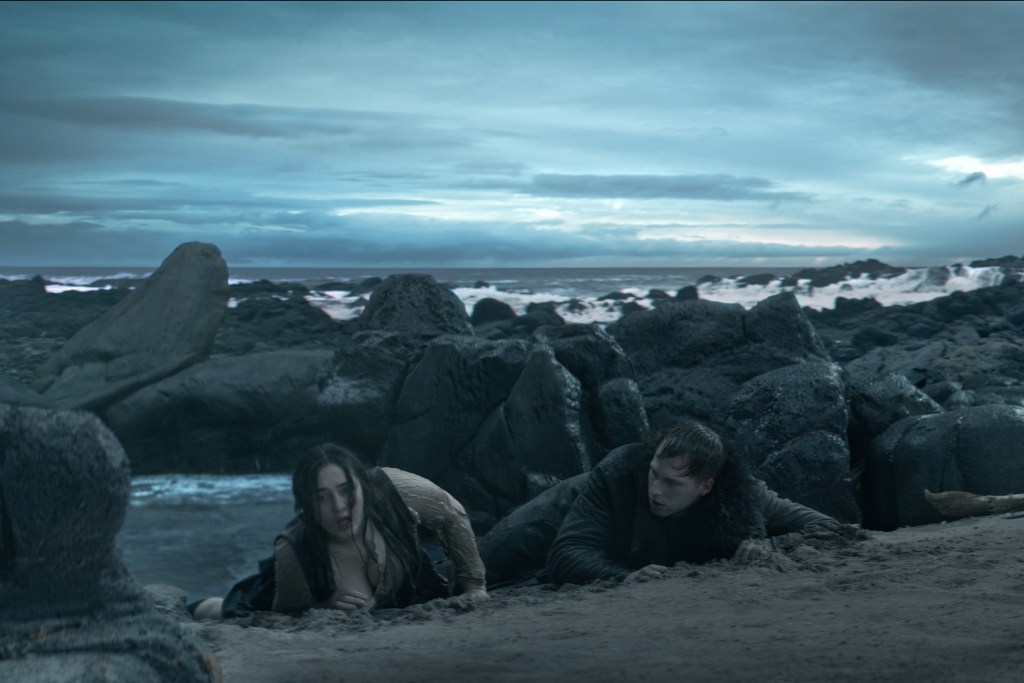
Nina and Matthias at Sea
Episode 6, 8:00 – 10:04
So we’re going to jump ahead to the next episode, episode six and catch up with Nina and Matthias, who are not having a good time.
No, no, they are not.
This is a short scene, but I wanted to ask you about it because water filming is notoriously difficult.
Oh my Lord. So here we are in the winter in Hungary, this is a water tank that our special effects team built in a studio space, but it was still cold. The water was heated as much as it could be, but you can’t heat it too much, otherwise there’s steam coming off of the people. So it was cold. And it’s a tank with guys, special effects guys on the sides with literally oil drums, with a stick attached to them that they’re pushing back and forth to create the waves. We have huge fans coming from many directions pointing at these guys and rain towers and rain wands so that is spraying water at these guys and all of it with the back splash, that is a green screen, so that in the wide shot, we can add a visual effects environment. But the water is quite deep.
As I recall, I think that Danielle [Galligan], Nina, could stand up on her tippy toes and keep her mouth out of the water.
That sounds intense and it sounds loud.
It was intense. It was loud. They had to ADR all of their dialogue because of the heavy machines that were running throughout all of it. And the water depth, as I recall, had to be that deep because Calahan [Skogman] is so tall and so that he didn’t have to kind of crouch and to make it real so they could float, he had to do a lot of that swimming.
It was really difficult. The two of them were absolute rock stars through this. There’s just no way around it. They had to be soaking wet in all that wardrobe.
Do you know how long you were filming this for?
Oh, golly gee, I’m going to say it was about eight hours.
They’re really earning their paycheck here.
Yeah. It was very difficult. And then of course them coming, not just this portion, but getting onto the shore and walking off as well.
Were there any Titanic references made while you were filming?
I’m afraid there were, and we stood there and we said “You know what? Jack could have fit on the door. Jack could have fit on the door!
That’s exactly what I thought as I was watching it. But I was also like, this is like a healing experience for me, years later to see them both survive, you know?
Yeah. That’s right. And these two are such wonderful people. When we were doing the auditions for Matthias, Danielle was part of them. And I think I auditioned five or six guys, put them all on tape, and with Danielle playing all these various scenes with these different guys, it was really fun to play with her. And she’s so alive and so awake. She’s just a fantastic actor, really terrific.
So you were involved with the audition process?
Yes, at this point. I think I had arrived in Hungary the day before, and then we were bringing in all of these young actors from all over the world to audition with Danielle and to do a little chemistry feel and honestly, they had already winnowed this pile of guys down to around five, and they were all spectacular. They were all spectacular by this point. They were really, really great choices. So it was an embarrassment of riches, but you know, Calahan was fantastic. He just won it, he just had that extra something.
Conclusions
Those are the three scenes that I wanted to talk to you about. I honestly feel like I could watch both of these episodes and talk to you about all of them, because there’s so much in here, but I really appreciate you taking the time to talk with me about what we did see.
Yeah. That’s my pleasure. And I’m so glad that you saw the shadow. I honestly didn’t think you guys would see that. I’m so happy you did. And look for other things in there where you can see the camera definitely trying to support whatever the subtext of that character is. And there’s lots of those. And that was something my director of photography, and I, we went through a lot and said, “I really want the audience to have a visceral experience here.”


